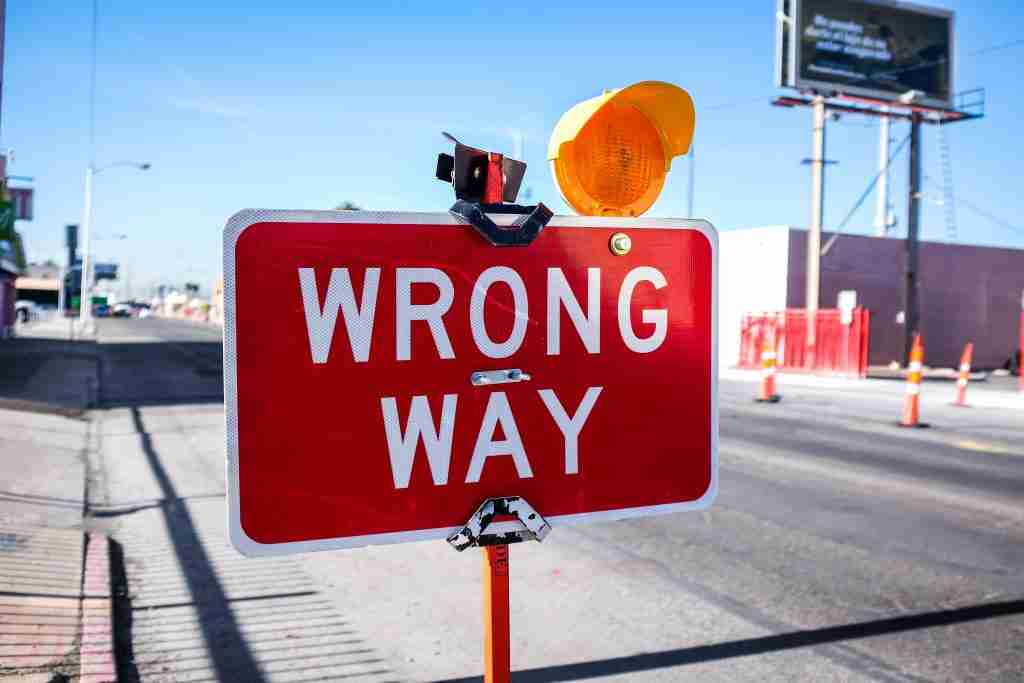Common money mistakes to avoid (All 40 of worst money mistakes)
Ahhhh why did I do that?
We have likely all made a host of common money mistakes but have hopefully dodged the worst money mistakes (more on this below)
Bought the thing that we couldn’t afford, wasted money on things that didn’t last or regretted buying that thing we didn’t need.
The worst thing you can do is repeat the same mistake — learn from it or learn from other people’s mistakes.
Avoiding common money mistakes is crucial for maintaining financial well-being. Some key errors to steer clear of include overspending, neglecting to save for emergencies, accumulating high-interest debt, and failing to budget effectively. By being mindful of these pitfalls, you can make smarter financial decisions and pave the way to a more secure financial future.
Lets find out 40 of the most common money mistakes and how to avoid them!

What are common money mistakes
Common money mistakes are those that nearly all of us make at some point in our lives.
Sometimes these are made due to a lack of experience, bad luck, or poor decisions.
The good news is that these poor money decisions are very common so you are in good company.
The bad news is that you will probably make one or more in the time you have left.
So here’s a list of the biggest personal finance mistakes to avoid as best you can.
Not having a financial plan
You probably have a vague plan in almost every other thing in your life.
I doubt you turn up to the airport and pick a flight to go on. If you do you probably at least pack a bag which requires some thinking.
Or just jumping into your car and driving around until you decide where to go.
Nope all of us need to have some sort of destination before we head off in any direction.
The same goes for your money.
- Where are you trying to go?
- What do you want to have?
- When do you want to do it?
- When do you want work to become optional?
How to avoid this financial mistake
- Write down what you want.
- When do you want it?
- What’s your reality now?
- Can you guesstimate what it’s going to cost?
- What are your ideas to reach your goals or amount of money?
- What will you do first, second and third?
Saving for children — but not yourself
I’m sure when you are on a plane, you will have heard “put your own mask on first”. This means that you must ensure your own safety to be of any use to anyone else.
How to avoid this financial mistake
- Set up your own saving and investing first
- Figure out what your freedom number is?
- Once you have your own,
- emergency fund,
- debt under control,
- relevant insurances in place,
- paying yourself first and living within your means.
- Then you can look at increasing your children’s financial literacy and then start to think about saving for them
Buying too much house
I know you just want a bigger house. At least the same as your parents or as big as your friend with the huge house.
A big house could be a massive financial trap for you. It will likely be the biggest debt you spend paying off for the most prolonged period. That could be a significant financial milestone for a long time.
How to avoid this financial mistake
- Buy the house you can easily afford – factoring in that sh*t happens, and you need to be able to cope with losing a job, significant fixes, car or home and or a global pandemic closing everything for 3+ months
- Don’t max yourself out with nothing to spare on the mother of all mortgages – sleepless nights about repaying will not be a good price to pay for that extra room.
- Live your own life, and choose your own house.

Forgetting that you are mortal
What! I’m in my twenties; this will go on forever, right? Wrong.
I’m now in my 40’s, and it doesn’t feel like it will go on forever anymore.
Once you start experiencing the deaths of grandparents, parents, siblings and/or people your age from ill-health or bad luck, we can all go at any time.
Suppose you have or have had an unhealthy lifestyle or already suffer from underlying health conditions. In that case, you are unfortunately tipping the odds even further into it isn’t going to last as long as you think bracket.
As a result of you realising you aren’t mortal you might want to sort your finances out for those that are left behind. Those who will have a pleasant surprise or those who need to clean up the mess. But especially for those who depend on you and will now struggle financially without you.
How to avoid this financial mistake
- Admit it’s not going to go on forever
- Set up a will and keep it up to date
- Think about those that will be left behind – how will they cope?
- Given the above, do you need life, critical illness, or income protection?
- Keep your finances and paperwork neat and tidy – meaning easy for someone else to follow
- Share the financial management with another so that one person does not have all the burden or knowledge.
Bomad -bank of mom and dad
Borrowing or receiving gifts from the BOMAD can be great but don’t forget someone else is “losing” that money.
Make sure you aren’t creating financial problems for your parents.
Be clear on what it is and what the conditions are. Is it a loan or a gift?
And don’t forget one day you might become the bank of mom and dad so save and invest wisely.
But not forget to put your own oxygen mask on first.
How to avoid this mistake
- Keep conversations about money open with your parents to understand each other’s situation
- Is it a loan or a gift? Get this clear from the start to avoid later arguments over repayment or the lack of them
- Start saving it’s your turn next to be the bank of mom and dad if you have or want children.
Being underinsured
Forgetting that bad things happen, and if they do, it’s going to cost someone something.
Not being able to work and losing all or part of your income because of this.
Needing to pay for care or needing to do it yourself could be tempered with relevant insurance before significant changes in your or a family member’s health.
How to ensure you have the right insurance in place
- Guestimate what it will cost you or your family if you die, get ill or are too sick to work?
- Put in place adequate protection to cushion any such shocks.
- Ensure you have considered some of the likely basics, e.g. a mortgage for x years, childcare costs to 18, relocation costs or whatever other shocks the survivors are likely to go through.

Not understanding your cash flow
You earn a lot of money so everything must be alright, right?
That depends how much you spend?
If it goes out as fast as it comes in and if even just one more £ $ € goes out than comes in, then you have a problem no matter your income.
How to get you cash flowing
- Set up a budget detailing incoming and outgoing cash
- Understand your burn rate – how much of your money do you burn a month – it’s it 50%, 80% or 101%
- Or the other side of this, figure out how much of your paycheck you get to keep? That’s your saving rate
Having no financial goals
You probably have limited reasons to save or invest if you have no financial goals. Hence why you probably don’t have any savings.
Without a goal, you are rudderless and likely just drifting. Where will that get you? Let’s hope nowhere near the rocks.
How to create financial goals
- When would you like work to become optional?
- What would you like to do that costs money? And when do you want to do it?
- Travel
- Study
- Get married
- Buy a house
- Write the above down with a timeline and a money amount. Now figure out the steps in between now and then.
Not keeping and sticking to a budget
Would you get into a boat without a rudder? Nope, because you can control where it’s going.
It’s the same for not working with or a to a budget. You are at risk of drifting onto financial rocks.
How to stick to a budget
- Set up a simple budget
- Track your spending and adjust the budget to your reality
- Give every $ £ € something to do.
- Check you are happy with where your money is going
- Get an app to make it easier to track and analyse what is going on with your money.
Too much risk or having all your eggs in one basket
Having all your eggs in one basket is seldom a good idea.
More or less putting it all on black and hoping for the best. Good luck with that.
Having all your investments in the same company that you work in. Investing in one or only a few companies, sectors, or countries could be concentrating your risk in one or more house of cards.
Investing in the latest thing, that has no track record.
How to reduce your financial risks
- Diversify your savings and investments
- Try to have multiple sources of income
- Have an emergency fund in place
- Have the right level of insurance in place
- Never risk everything
- Make sure that if it goes wrong, it won’t destroy you.
- Plan for things to go wrong.
Not taking enough risk
Are you petrified of losing it all, all the time?
Classically this is often about investing in the stock market.
Everything has a risk. Keeping all your money in cash is risky because it’s always losing its value to inflation.
Investing has risk but more chance of reward.
How to avoid this financial mistake
- Realise that you must take some risks
- Cash is not an investment and is always losing value to inflation.
- Understand the connection between risk and return, especially on your path to building wealth.
- Now thy self. Work on understanding your risk appetite, but not forgetting that everything has risk. Which risks are worth you taking for a better-expected return?
Not saving enough
Probably more, that’s what you should be saving.
The more you have saved the more options you have. To travel, study, work part time, take a break and many more.
How to save more
- Write down what you want, what you really really want. What will this cost?
- Set up savings accounts called the things you want, e.g. round the world trip, new bike, start own business.
- Pay yourself first. Don’t spend and then save what’s left. Flip that around. Save first and spend what’s left.
- Set up an emergency fund of 3-6 months savings or more if you feel its necessary in your case.
- Give yourself a buffer for when you might want more flexibility to change jobs, reduce your ours or want a complete break.
- Start saving now and more than you think
- Automate the savings. Make it easy for yourself and do it automatically without even thinking about it.

Not investing enough
For work to become optional, to go on that round the world trip and or supporting your kids later in life is going to take money. It’s going to be difficult just to earn and save that in cash.
You will need to invest it and have the chance of higher returns, whether in the stock market or property investments.
Investing your money into the world’s great companies has a higher chance of growing and keeping pace with inflation than keeping it in cash – which will lose value every year.
How to start investing more
- Start small when you start investing – test the waters and see how you feel with the rises and falls.
- Diversify your investments – you could choose funds that hold hundreds or thousands of companies across the world.
- Understand compound interest and how it’s your friend
- Invest for the long term
- Understand the difference between short term drops in the market and the permanent upwards trend of the global stock market.
Ignoring your pensions
Your young so can’t be bothered to get interested in pensions its never going to happen anyway.
You don’t understand pensions so can’t, or won’t get interested in them.
We all just need to remember a pension is your future spending so one day it will be really interesting or the only thing you will live off.
How to get to grips with your pensions
- Sign the forms you need to sign at work.
- Check if the default pension is right for your age, risk tolerance and likely financial needs.
- Make sure you name the person you want any funds transferred to in the event of your death.
- Keep track of your pensions – who there with and where they are – and keep this info up-to-date and safe. One day you will need to start spending this money.
- Track the value of your pensions yearly to understand that is happening.
- Remember a pension is your future spending. It’s likely where a lot of your wealth will come from.
Racking up consumer debt
Buying more and more stuff on credit, probably because you can’t really afford it. You just want it.
The more and more debt you take on, the more you will need to work to pay it off.
Debt compounds and continues to grow if you aren’t paying it off. If you are only paying off the minimum, you might spend years or decades paying it off.
This deadweight of debt is dragging your wealth-building down and down. The more debt you have, the longer and longer it will take for work to become optional.
How to avoid consumer debt
- Don’t but things you can’t pay for in cash or at least pay it off straight away
- Pay off your credit cards in full every month. Automate it to make it just happen.
- Keep your credit cards to a minimum. Get rid of store cards. Use credit carefully
- Get rid of emails and alerts about the latest products you know you will be tempted to buy
- Save up for things.
- Delay spending money. If you see you want something, can you wait 24hours or 30 days? If you can, this gives you time to review if you really want it and how you are going to pay for it.
- Keep a budget and live within your means
- Accept that someone will always have more than you.
Quitting your job without a plan
I know what you’re thinking that’s it I’m outta here. I’m going to launch the next Google from my garage.
This might be true, but it’s a steep curve to climb and burn all your bridges and your one real source of income.
Starting a business or finding a new job might be harder than you think.
If you quit your job but can’t create or find another source of income quickly, you might find it a growing financial problem. This lack of income can create massive pressure on you and others to make it work asap.
Write out a plan for what you want to do, talk it through with someone (probably not your manager). Think about how long you can go without earning an income.
How to plan for a job change
- Keep the 9-5 for now
- Can you work part-time?
- Build up a cash buffer to cover you for 12 months to reduce the pressure to earn straight away
- Test and prove you have a market or customers to sell to before quitting.
- Give yourself as long a runway as possible before money starts to become a problem.
- Try and leave on good terms in case you need to go back!
- Keep your contacts up to date in case you need to find a job at some point.
Drop us a line if you would like a free 30-minute conversation on you and your money. And how to avoid some of these financial mistakes contact
Using credit cards for everything
Putting everything on plastic can be convenient, quick, and seemingly painless. However, these factors may also encourage you to spend more than you need to or worse more than you have.
Using plastic for everything can give the feeling of limitless spending as no immediate pain is involved.
When the end of the month comes, we start to feel the pressure to repay and the pain of regret at all that spending.
The use of credit cars without a repayment plan can lead to a growing snowball of debt as it racks up, and you can only repay the minimum amounts.
How to avoid credit card debt
- Use credit cards carefully – understand what the repayment terms are. Would you buy a shirt with a loan of 19%? If so, this means you are willing to pay £100 for a shirt that costs £60 after all the interest charges depending on how long you take to pay it off.
- Use cash when you can. Paying cash is more painful as you can see and feel the money you worked hard for being handed over to someone else.
- Have a clear plan to pay off everything you buy on a card each month.

Stagnating in a job
When you get comfortable, you tend to stay still; this can have some benefits, and maybe the right thing to do at a particular time.
But for years and years?
Depending on your job sector or role, you might find that moving jobs and companies is the only way to make real progress in responsibility and salary.
Moving can feel risky, will it be better or worse somewhere else? The only way to find out is to give it a try and see.
How to avoid this financial mistake
- Think about your BRIAN
- What would be the Benefits of moving?
- Are their any Risks of moving?
- Do you need any more Information to make the decision?
- Are there Alternatives to moving?
- If you did Nothing what would happen?
- Figure out has your salary changed over the years, and are you bothered about this?
- Is there a way to move up, sideways or out for better prospects?
Keeping up with the Jones
Ahh, those Jones or whatever the most common family name is where you are.
They are a couple or family with all the latest stuff, house, holidays and cars and you want to be them, badly.
So badly you are prepared to ruin yourself financially to chase and/or complete with them.
Only when the tide goes out, do you discover who’s been swimming naked.
This quote means that you have no idea how or if the Jones can afford what they have or are doing.
- They can afford it because they have an exceedingly high income
- Maybe that can afford it because something or someone is subsiding them – parents, grandparents or a business.
- They can’t afford it, but they can afford the payments.
- There not affording it at all. They are broke but haven’t hit the financial wall – yet.
How to avoid comparing yourself to others
- Easier said than done but want what you have while you work for what you want.
- Don’t compete with others, let them live your life and yours.
- It’s annoying I know but live within your means or increase your means.
- Turn off the social media highlights of others that you can’t tell if its real or just someone swimming naked under the waves.
Not living to a spending plan – where has all my money gone!
You see the cunning trick here? A spending plan sounds much more fun than a budget. A budget can seem restrictive, but a spending plan is about spending money. Your money. What could be more fun than that?
Have you ever gone down a steep hill on a bike or driving a car? Despite your appetite for danger, its likely all of us have felt the need to start pumping the brakes and start steering more strategically once things begin to speed up. You want your bike, car or money to go more in one direction than another, e.g. not off that fast-approaching cliff edge.
Well, this is the same for you and your money there will be times when you need to take more control directing it to where you want it to go and at what speed.
How to avoid spending more than you have
- Set up a simple
budgetspending plan detailing where you want your money to go. - Track your money through your bank account, statements, or an app to see what is happening. Are you happy with where it’s going? If not, change it.
- Save some money first and then spend what’s left not the other way around.
Not Preparing for change
“Nothing last for every even cold November rain” Guns and Roses.
That secure job, that next contract or the best manager you ever had are all subject to change for the better or worse.
If your landlord decides to sell or up the rent significantly, you get a new housemate, which was a mistake.
Your relationship breaks down, a loved one needs caring for, or you need caring for all requiring more of your time and money than previously.
All the above and many more might represent a significant change that knocks you off your current straight and narrow path.
How to prepare for job changes
- Keep your cv and LinkedIn up to date.
- Have savings to ride out any changes.
- Have an emergency fund (more below) to cope and adapt to a significant bad change.
Not having an emergency fund
As above, without a safety net or an emergency fund, you are at high risk of not being able to cope with a significant downturn in your fortunes.
Losing a job, and incurring a large and or unexpected bill while living through a global pandemic (!) can tip many of us into financial difficulty or, worse, crisis.
One of the critical financial foundations to prevent difficulty turning into a crisis and then a disaster is a well-stocked emergency fund. Enough money is easily accessible to ride out any significant challenges.
Typically, this is 3-6 months of spending money in an easy-access account. Maybe not too easy so you use it for non-emergencies, i.e. a takeaway when you can’t be bothered to cook.
Don’t be overly bothered about the interest rate as this is not what the account/money is for. It’s for an emergency so that you don’t go into debt, coping with the change or expense at the time.
How to avoid this financial mistake
- Figure out how much money 3-6 months of spending is for you. Then start saving that money in a safe place – not under the mattress. Start saving like its an emergency that you don’t have an emergency fund.
- Set up clear rules for what is and is not an emergency. This should detail when the emergency fund can and cannot be used.
- Keep it topped up after you use it or as your expenses change.
- Depending on your risk tolerance or need for safety, maybe it should be larger than six months costs.
- An emergency fund is an account for when not if an emergency comes. Start saving for it now.
Just thinking about day-to-day money – no long-term planning/vision
If you are just head down day-to-day spending, you will lose sight of the bigger picture. Where are you trying to get to?
Before and when you go on a journey, you are likely envisaging what it will be like when you get there, what you will do, how it will feel, and who you will be with.
When you are actually on the way to your destination, you usually look into the near distance to see the road and navigate or drive in the right direction.
It’s probably only occasionally that you look directly at the ground in front of you.
Are you taking a long-term view of your finances and figuring out where you want to go, what it will look like, what you will do and with whom when you get there?
What’s your vision of your ideal future?
How to avoid this financial mistake
- Set up savings accounts for
- Emergencies
- Day-to-day spending
- Spending in the next five years and the next ten years
- Spending for when you want work to become optional
- When do you want work to become optional?
- What do you want your retirement to look like? What is that going to costs? And what does that mean you need to save and invest now?
No talking about money before marriage / with a partner
Many things can scupper a marriage or relationship.
The big ones are
- Sex – how much, how often, how and who decides.
- Children –when or if will you have them, how many, who and how you decide.
- The in-laws – how often you see them and who decides.
- Money – how much is enough, what to spend it on, saving vs investing, who and how you decide.
Everyone has a different money blueprint or how they think about money for better or worse.
Some are super savers, and some are super spenders. Opposites might attract, but they might not be well suited to staying together.
Understanding you’re, and your partner’s money mindset might help avoid later pain and or avoid relationships doomed from the start.
How to avoid this marital money mistake
- Talk about money with your partner,
- What does it mean to you, how do you feel about it?
- How much money would be enough?
- Will you keep your money separate, jointly or a bit in between?
- What will you do with your individual and joint money? How much will you spend, save and invest?
- What will happen if one of you earns significantly more than the other?
- How will both of you understand your financial position even if one takes the lead?
- When would you like work to become optional?
Not knowing your numbers.
If you’re going on a journey, you will likely need a few bits of information. Where you’re trying to get to. When you want to arrive. What you want to do there and your starting point.
These are part of figuring out how to get to where you want.
This is the same for your goals or desired lifestyle and how the money will be part of the plan to get you there.
The numbers you need to know
- Your net worth; your starting point?
- The amount of your monthly paycheck you get to keep or your savings rate?
- What you’re spending a month and a year?
- How much is enough or your freedom number?
These numbers will help you determine your starting and endpoints, what you need to do in between, and how you might do this.
How to avoid this financial mistake
- Figure out your numbers
- What’s your net worth? Everything you own minus everything you owe.
- What’s your savings rate? How much do you save of your monthly income?
- How much money do you spend a month/year?
- What’s your freedom number? What you spend times 25 or 33 depending on your margin of safety.
- How could you improve on them?
- Raise your net worth
- Increase your savings rate
- Lower your spending
- Get closer to your freedom number
Not having a will
Don’t ask for whom the bell tolls it tolls for thee
For Whom the Bell Tolls
by
John Donne
In other words, at some point, it’s going to be your turn to go. For that, you can be sure. No one is getting out alive.
So far better to accept the inevitable and plan for it.
A will can help ease your passing by clearly stating who you want to benefit from your estate, savings, investments and any death pay-outs from insurance etc.
Making this clear should help those left behind divide the estate as smoothly as possible.
How often have you heard of an all-out fight happening to rich or poor celebrities who have not left a will? Leaving the family to argue over who was promised what will not be a fun task.
There’s nothing like a death and then a will reading for the vultures and family feuds to appear or reappear once there is money involved, especially if there is a lot of money.
Don’t leave a mess and unclear wishes as your last gift to those left behind.
How to avoid this financial mistake
- Detail who and how you want your estate divided up, however large or small.
- Who do you want to receive gifts, heirlooms, or collections?
- Do you want to detail the arrangements for your funeral, music to be played, readings to be read etc.?
- Leave some funds available for the funeral and wake – they are often more expensive than you think.
- Use a proper firm to help you pull your will together. A will is not something just to have a stab at by yourself. Get professional help.
Frivolous spending
Have you got collections of stuff that you don’t need or want? Can you even remember buying this stuff? Were you throwing your money around like confetti?
Sometimes we get caught up in the moment and spend money like there’s no tomorrow. Things we don’t need and, with a bit of reflection, didn’t want either.
Maybe you are bored, showing off or encouraged by others to treat yourself and bang, the thing is bought, and our money is gone.
How to avoid this spending mistake
- Keep a spending plan
- Track your spending
- Set rules for yourself about when and how you will or won’t spend your money, i.e. I won’t go shopping when I am feeling down, or I will wait 24 hours before purchasing any impulse buys that are tempting me

Relying on someone else
Here’s where the fairy tales ends. No one is coming to the rescue. Or at least it’s highly likely no one is coming.
It’s down to you to get out of any mess and grow your wealth.
A man or woman is not a plan.
The government or benefits systems is not a plan.
Selling your house is not a plan for your pension.
You might think you can marry, inherit, steal, beg or borrow your way out of debt or into wealth, but these are massive longshots with many downsides.
Better to think, realise and started acting as your rescue service like it’s already an emergency.
How to avoid this financial mistake
- Know your numbers
- Set up an emergency fund
- Protect yourself from disaster with insurance
- Set up your own or joint will.
- Improve your financial literacy through books, blogs, podcasts and youtube.
- Save money for your short-term, midterm and long terms needs
- Figure out when you want work to become optional and work, save and invest towards it.
Overspending, or too much house.
There are three classic areas to overspend on.
1.Your house – buying far too much house for your means. Pumped up by what you are told you can afford you set yourself up for the biggest mortgage you can get.
The trap has been set, and you have walked straight into it. Now you are trapped paying your house off for the next few decades. No, your home is not an asset; it is a liability because it costs you to live there and not earning you anything.
2. Too much car is also a significant cause of overspending. Too big to fast or too expensive again, your ego has made a trap for you. You have confused what you can afford with what you can afford to repay.
3. Too much lifestyle- living way beyond your means. Nights out, holidays abroad, the latest gadgets and clothes all pushing your finances up to and beyond their limit.
How to avoid this financial mistake
- Live within your means or increase your means
- Create a spending plan and live to it. Track where your money is going and review if you are happy with this.
- Live your own life, and accept where your limits are.
- Be crystal clear and accept what you can afford without financial worries. Not just what you think you can afford to repay.
Ignoring the problem: the ultimate example of a bad financial decision.
What problem? I don’t have a money problem. I have a lack of money problem, which is the problem.
I have too much month at the end of my month.
A friend of mine once said it was like a health issue. They knew they should be looking for lumps in certain sensitive areas of their body, but they couldn’t be bothered and didn’t want to know even if there were lumps. They would rather ignore the problem until they are forced to deal with it.
Fine, but that method will involve much more pain than looking for lumps every day.
The pain of discipline over your finances or the pain of regret. You choose.
How to avoid this poor financial decision
- Start tracking your spending; see where it is all going. Are you happy with that?
- Check your payslips to see what is coming in. does it look right?
- Look at your statements every month.
- Review your net-worth every year. Is it going up?
- Is your debt growing? or are you paying it off and a what rate?
- Put a plan together to manage your money.
Spoiling your children
Only the best for my kids they will want for nothing.
Spoiling them is potentially a ruinous route for your bank balance and your child’s future bank balance. Spending like this may well be training your children to spend like this into their future.
Getting them everything they want with everything coming so easy might well be setting them up for future financial problems as they are unable to defer buying things or saving up for them. They might well be conditioned for instant gratification and the financial pain this may bring.
How to avoid this financially bad decision
- Keep things in perspective – for the first 6ish years, your children are unlikely to be able to tell brand-named or brand-new goods from second-hand stuff. Unless of course, brand names are all you talk about, then you are probably already teaching them to want them.
- Think about pocket money – will it be for free or as a result of chores?
- Will you encourage or make them save, invest and give away a % of all the money they receive to start building these habits?
- Make them contribute to anything they want or at least feel like they have earned it somehow.
Inheritances – don’t count on them
My parents are going to pass done their wealth.
Grandma has promised me some money in her will.
I have seen the will and what I will get.
These may all be true, but so many curve balls can come in the way of you and expected inheritance.
To name but a few things that might mean there is nothing left, or it swerves around you
- Unexpected care costs – living in a nursing home is costly. Will there be anything left?
- The second or third marriage which sees some or all of the pie goes in a different direction
- Grandchildren inheriting a significant chunk, meaning it skips a generation.
- Updates and changes to the will you were not expecting
How to avoid this money mistake
- Don’t count your chicken until your eggs have hatched.
- Put your mask on first, and don’t wait for someone else to rescue you. Its highly likely no one is coming to the rescue, family friend or the state.
- Ensure that wills are kept up to date to reflect any significant changes.
- Talk with your parents to understand their wishes so there aren’t any nasty shocks later on.

You don’t haggle/look for better prices
Don’t you want to haggle? You know, ten for that you must be mad!
I can’t be bothered to haggle. It’s embarrassing and awkward.
Will I save that much anyway?
Who knows until you try, but the likelihood is you will be able to keep more of YOUR MONEY than you would have handed over without at least asking.
If you do it with a sense of humour and realism, then the seller and you can part on good terms if they say no.
How to avoid this bad financial decision
- Don’t buy something in the first place you see it. This slight delay might also help you save all the money because you might realise you don’t need it. But if you do, try and find three quotes and compare which offers the best value.
- Haggle every time you renew a service, electricity, gas, broadband, mobile phone etc. Take a few minutes to scan around the leading competitors and get some quotes from sites like Gocompare and Compare the meerkat. Use this info to haggle for a better rate.
- Money-saving expert often has excellent tools to compare offers.
- Check out these cashback websites, which might help you earn some additional income while providing cost comparison alternatives to your current provider. Topcashback* and Quidco*
You don’t enjoy your money
Beans again tonight?
Maybe you’re not spending money on things you actually enjoy or get value from.
Or on the flip side maybe you’re not spending enough of your money on the things you do enjoy.
This is where your frugality has gotten the better of you, and it might make you miserable.
In your budgeting spending plan, you could or should look for some fun things to enjoy your money on. It could be small, a nice coffee, a book or a big thing like a weekend away.
If it’s clear you have the money and you don’t have to think about can you afford it, could you enjoy your money?
How to avoid this financial mistake
- Figure out what you want, what you really really want and spend money on that
- Figure out what your values are and spend your money on that.
- Figure out the difference between your needs and your wants.
- Remember what you really want vs what you want right now and spend money on that.
- Have a splurge fund. A stash of money just for fun, no gilt no regret. Enjoy it, as long as it’s legal, and you have got three quotes (only joking).
You don’t invest in yourself. A classic example of a bad financial decision.
The only thing I read now are menus.
When was the last time you read a book for learning? And particularly for your financial knowledge?
Learning should be lifelong. I’m afraid I don’t think you learnt everything at school, college or university. That likely equipped you with the ability not to get run over crossing the road but had limited lasting impact on your financial literacy.
I’m guessing you wouldn’t want your dentist, plumber or mechanic to stop learning the moment they left their education. I bet you hope the dentist continually updates their pain relief knowledge and the mechanic their mechanical safety awareness.
If this is the case, why aren’t you updating your skills every year technology-wise, sector-wise and financially wise?
Keep learning to improve yourself, even if only by one per cent daily.
You are your greatest asset; why not keep improving your ability to earn, manage and grow your wealth.
“Formal education will make you a living; self-education will make you a fortune.
Jim Rohn
How to avoid this bad financial decision
- Find the next relevant course in your field of work, interest or hobby. Is now the time to upgrade your skills?
- Find podcasts in your professional area or an area you would like to know more about.
- Find books or audible books in your chosen interest area
- Ask trusted friends or colleagues what they read to improve themselves.
- Search on google “the best books for ……” whatever you want to learn about.

You forgot kids are expensive
How much can a baby eat? More and more each day, and it’s not just what they eat but what comes out the other end that will cost you. Probably for at least 18 years.
I believe kids are like boomerangs nowadays and come back to live with you even after they have left for university or their first job. You may never get rid of them!
Childcare costs are a massive drag on your finances.
Some people say they would never pay private schooling fees even if they could. Well, childcare is more or less about the same as private school fees up to the age of 5 ish.
How to avoid this bad financial decision
- Realise and accept kids are a terrible financial decision and start saving NOW.
- Figure out what the costs might be especially childcare costs out this into your budget and see how it affects everything else
- Make yourself aware of any government, employer or private childcare schemes than can provide support with the costs.
- Tap into your local parent networks and nearly new sales. Facebook can be a useful resource for finding local events, sales and get-togethers, which are far cheaper than regular shops.

It’s going to be the event of the year. All my relatives, Facebook and LinkedIn friends have been invited. Everyone is getting favours and ribbon covered chairs blah blah blah at a rate of £250+ per person.
And we got a loan at a rate of only 19%!! / myself and my parents are selling a kidney and lung to cover the costs.
Weddings are expensive. The number of guests raises costs exponentially.
Wedding dress, suit hire, photographer, videographer, 3-course meal, alcohol, venue hire, ceremony fees, car hire, disco, entertainers, after-party meal, honeymoon and on and on its goes.
How to avoid this bad financial decision
- It’s a big day in your life and should be treated as such – but it is only one day in your life. Reflecting on this perspective might save you a lot of time, money and stress.
- Have the things that you really want and value at your wedding, not what other people had at their weddings. Have the chocolate fountain, ice sculpture and magicians because they mean something to you not because someone else had them.
- Started saving and budgeting for a wedding as soon as you know it’s coming and then have the wedding you can afford.
- Can you save money by making it smaller, borrowing things, doing it on a weekday, anything to get some do the costs paired down and within the perspective of your financial reality?
You make the minimum payments
I can afford it or are you saying you can afford the minimum payments.
Your debt can quickly grow out of control and all proportion to what the item you bought cost. This is because you are still charged a high interest rate when you just make the minimum payment.
By making the minimum payment you are setting yourself up to pay way over the odds for that must-have, stretch out that debt into the months, years or decades ahead for large purchases.
Why store all this negative energy up for yourself?
How to avoid this bad financial decision
- Use credit cards carefully. Understand what it costs to use credit and minimum payments.
- Automate your payments – take the decision-making out of it.
- Figure out what this method is costing you in time and money – when does it mean you will pay off the debt and what will that debt have cost you in time and money?
- Pay the cards off in full
- Only use cash, thereby feeling the pain of buying the item but knowing it is truly yours.
- Only buy what you can afford. If you have to ask “can I afford it” you probably cant.

You have not invested in your financial literacy
Reading is for wimps; we all know that, right?
Err nope. I love libraries. Just thought I would get that out there.
A library is a place full of all the world’s greatest learning… FOR FREE. All you have to do is get a library card and start reading.
Now the next step is to at least occasionally read books that have practical, spiritual, psychological and social applications to name but a few life lessons to learn.
There are lies dam lies and statistics but here goes. 51% of UK adults read a book in the last year (the year being 2018). Let’s say that’s broadly true and that means 49% or thereabouts didn’t read one book in 2018………….hmmmmm.
Maybe we can take out those unable to read for many reasons, very old, ill health, poor reading ability. It still seems like many people haven’t read a book in a year.
Then you add the fact that a lot of the people who were reading may well have been reading fiction. I imagine the number of people reading personal finance books drops even further.
So, adding one personal finance book to your reading list would not be impossible. But if it was, you can, of course, listen to books, podcasts or YouTube videos to start improving your financial literacy 1% each day.
“It isn’t what the book costs; it’s what it will cost you if you don’t read it.”
Jim Rohn
How to avoid poor financial literacy skills
- You are now spoilt for choice. Find your podcast, Youtuber, book or audiobook style* to take your financial literacy to the next level. Here are a few resources that might be of interest Link
- Remember the first time you hear a concept it might sound like gobbledygook but the 2nd and 3rd time it will become more familiar. Think like a learner you are exploring how to manage YOUR MONEY better, so cut yourself some slack and keep learning.
- Yes, many people may be DUMB (Don’t Understand Money or Business), but do you have to be one of them?
- Go one read one book I dare you! or even better get the author to read it to you with Audible*

Not reviewing your standing costs every year – utilities, internet etc
I bought whatever I bought and now can’t be bothered to check it. The electricity is on, so why should I bother changing it?
Many of us think our greatest strength is our apathy, but it may also be our greatest weakness.
You have just got used to the pain or creeping costs. In fact, this is what most companies are counting on that you will do nothing.
Remember it’s your money they are taking. ITS YOUR MONEY.
Its takes about 20 different minutes to compare a few different internet, electricity or whatever providers. If you sign up with them, they will then often sort out all the rest for you. Saving at least £5 a month on your current provider will probably not be that hard. Over a year that’s £60 of YOUR MONEY earnt in 20 minutes. Not a bad return.
How to avoid this bad financial decision
- Funnily enough, it’s reviewing your standing costs every time they come around for renewal. Go to a comparison site and compare what’s out there.
- Remember it’s YOUR MONEY they are taking; why not try and keep as much of it in your pocket as possible.

Living beyond your means
I want it because I’m worth it. Well sort of, actually I just want it.
Faux rich is a widespread trait now. You don’t have to be rich to look rich; you just need to be able to afford the minimum payments, and then you can have what you want.
Here is the eternal trade-off what you want most vs what you want now.
- I want six-pack abs, but I want cake now
- I want more free time, but I want an internet of things across my house now.
- I want more freedom, but I want a new car, boat, “add an item here” now.
All of these are a trade-off for better or worse. You have to figure out what the cost is now and later.
One concept to think about is that money is like stored energy. The more money you have, the more energy you can release on the things you really like and value. The more energy you have, the more choices you have.
The opposite must also be true then, right?
Debt must surely be negative energy stored up. This negative energy must be sapping your ability to make choices now and in the future. The bigger the debt, the bigger the negative energy and ultimate point when the price for this must be paid.
Paid either in cash or in limiting your choices in the near or distant future.
“We must all suffer from one of two pains: the pain of discipline or the pain of regret. The difference is discipline weighs ounces while regret weighs tons.”
Jim Rohn
How to avoid living beyond your means
- Track your finances – Understand where it’s all going, and if you’re happy with that.
- Get a spreadsheet, your bank and credit card statements or an app like Moneydashboard* to review where your money is going. Categorise them into at least three columns
- Subsistence – keeps you alive, housing, food, travel
- Discretionary – you don’t have to spend this, but you are deciding you want to
- Luxury – you’re spending this purely because you want to.
- Set a savings goal for yourself. Save first and then spend what’s left.
- Pay yourself first. Think about how much of the money you worked for do you want to keep and how much do you want to give/spend away?
- Do you want to look rich or be rich?
- Accept that some people are richer than you, have more stuff and more expensive stuff.
- Try and earn more??? but be careful of lifestyle inflation.
“Don’t confuse the cost of living with the standard of living”
Warren Buffet
Not tracking your finances
I can’t be bothered to look. It’s probably all going ok. Look how much I earn.
How much do you spend though?
Is your company paying you the right amount?
How much is going into your savings, pension and investments? If any at all. What do you think this will add up to in 5, 10, or 20 years. Will it be enough? Enough for what?
Without tracking, you don’t know if it’s good, bad or downright ugly right now and stretching far into the future.
How to avoid this common money mistake
- Get a spreadsheet you know you want to – sort of. Add in your expenses to see what’s going on.
- If you want to make it really easy get an app like Moneydashboard* to track it for you. Then review is it going where you want it to.
- Figure out your net worth – all you own vs all you owe.
- What’s your freedom number?
- How much of an emergency fund do you need?
If you want to avoid big financial mistakes and scams, why not sign up for our free newsletter and set up an appointment to start a financial plan.
Sumamry of the worst money mistakes to avoid
| Money Mistake | Description | Solution |
|---|---|---|
| 📉 Not having a financial plan | Failing to create a roadmap for managing finances, leading to disorganization and poor decisions. | Develop a comprehensive financial plan that includes budgeting, saving, investing, and setting financial goals. Seek professional advice. |
| 💰 Saving for children — but not yourself | Prioritizing children’s financial well-being over personal financial security. | Allocate funds for personal savings and investments alongside children’s savings. |
| 🏠 Buying too much house | Purchasing a home beyond financial means, resulting in financial strain. | Set a realistic budget for housing expenses based on income and financial goals. Avoid stretching finances too thin. |
| ⏳ Forgetting that you are mortal | Failing to plan for unexpected events like illness, disability, or death. | Create an estate plan, consider life and disability insurance, and have a will in place. |
| 🏦 Bomad – Bank of Mom and Dad | Overreliance on financial support from parents, hindering personal financial growth. | Strive for financial independence by developing income sources and reducing dependency. |
| 🛡️ Being underinsured | Insufficient insurance coverage, leaving vulnerability to financial setbacks. | Assess insurance needs, including health, home, auto, and disability. Regularly review and update policies. |
| 💵 Not understanding your cash flow | Lack of awareness about income, expenses, and overall cash flow. | Track income and expenses, create a budget, and seek professional guidance if needed. |
| 🎯 Having no financial goals | Lack of clear objectives for financial growth and progress. | Set short-term and long-term financial goals, and regularly review and adjust them. |
| 💸 Not keeping and sticking to a budget | Failure to establish and follow a budget, resulting in overspending and financial instability. | Create a budget, track expenses, and practice discipline in adhering to the budget. |
| 🥚 Too much risk or having all your eggs in one basket | Exposing finances to excessive risk or investing all resources in a single investment. | Diversify investments across different assets and consider risk tolerance when allocating funds. |
| ⚖️ Not taking enough risk | Being overly conservative with investments, potentially missing growth opportunities. | Assess risk tolerance and consider higher-yielding investments based on financial goals. |
| 💰 Not saving enough | Insufficient allocation of income toward savings, hampering financial security. | Establish a savings plan and automate contributions to save a percentage of income regularly. |
| 💼 Not investing enough | Neglecting investment opportunities, limiting potential wealth growth. | Educate yourself about investment options and allocate funds to diverse investment vehicles. |
| 🎓 Ignoring your pensions | Neglecting to plan and contribute to pension funds, risking insufficient retirement savings. | Understand pension options, contribute regularly, and seek professional advice to optimize savings. |
| 💳 Racking up consumer debt | Accumulating excessive debt from high-interest borrowing, leading to financial stress. | Develop a debt repayment plan, prioritize high-interest debts, and practice responsible borrowing habits. |
| 🚪 Quitting your job without a plan | Resigning without a clear career transition or financial strategy, causing instability. | Assess financial situation, plan career transition, secure new income source, and build a financial cushion. |
| 💳 Using credit cards for everything | Overreliance on credit cards without effective debt management, leading to financial strain. | Use credit cards responsibly, pay off balances in full, and create a budget to control spending. |
| 📈 Stagnating in a job | Staying in a job without growth opportunities, limiting income potential and career advancement. | Continuously evaluate career goals, seek growth opportunities, and invest in professional development. |
| 👨👩👧 Keeping up with the Jones | Excessive spending to match others’ lifestyles, neglecting personal financial situation. | Focus on individual financial goals and values, avoid unnecessary spending, and live within means. |
| 💸 Not living to a spending plan | Spending money without a plan, leading to financial disarray. | Create and follow a spending plan, track expenses, and prioritize financial goals. |
| ⚠️ Not Preparing for change | Neglecting to anticipate and prepare for life changes, leading to financial stress. | Establish an emergency fund, anticipate major changes, and create a contingency plan. |
| 💼 Not having an emergency fund | Failing to set aside funds for unexpected expenses, risking financial instability. | Build an emergency fund with 3-6 months’ worth of living expenses and avoid using it for non-emergencies. |
| 🎯 Just thinking about day-to-day money | Focusing solely on immediate financial needs without long-term planning. | Develop a long-term financial vision, set goals, and allocate resources accordingly. |
| 👥 No talking about money before marriage / with a partner | Failing to discuss finances openly and honestly. | Have regular financial discussions, establish shared financial goals, and seek professional guidance if needed. |
| 🔢 Not knowing your numbers | Lack of awareness or understanding of financial situation and numbers. | Educate yourself about personal finance, track income/expenses, and seek professional advice if needed. |
| 📜 Not having a will | Failing to plan for asset distribution and guardianship after death. | Consult an attorney to create a legally binding will and regularly update it. |
| 💸 Frivolous spending | Excessive and unnecessary spending without considering long-term consequences. | Differentiate between needs and wants, practice mindful spending, and prioritize financial goals. |
| 👥 Relying on someone else | Overdependence on others for financial support without taking personal responsibility. | Strive for financial independence, manage own finances, and reduce dependency on others. |
| 🏠 Overspending, or too much house | Spending beyond means or purchasing a house beyond affordability. | Stick to a realistic budget, avoid stretching finances, and consider affordability before buying a house. |
| 🙈 Ignoring the problem | Avoiding financial issues instead of addressing them, leading to worsened situations. | Confront and address financial problems promptly, seek professional help when needed. |
| 🛍️ Spoiling your children | Indulging children with excessive material possessions or finances. | Teach children financial responsibility, set limits, and promote values beyond material wealth. |
| 💰 Inheritances – don’t count on them | Overreliance on future inheritances as a primary financial plan. | Focus on personal financial growth, savings, and investments rather than relying on uncertain inheritances. |
| 💲 You don’t haggle/look for better prices | Failing to negotiate or find better deals, missing out on potential savings. | Practice negotiation skills, compare prices, and seek discounts or better offers. |
| 🎉 You don’t enjoy your money | Not allowing yourself to enjoy the fruits of your labor. | Find a balance between enjoying money and responsible financial management. |
| 📚 You don’t invest in yourself | Neglecting personal and professional development, hindering financial growth. | Invest in education, skills, and self-improvement to enhance earning potential and financial well-being. |
| 👶 You forgot kids are expensive | Underestimating the financial impact of raising children. | Plan and budget for child-related expenses, anticipate costs, and adjust financial plans accordingly. |
| 💳 You make the minimum payments | Only paying the minimum amount due on debts, prolonging debt repayment and incurring more interest. | Pay more than the minimum payment to reduce debt faster and save on interest. |
| 📚 You have not invested in your financial literacy | Neglecting to improve knowledge and understanding of personal finance. | Invest time in learning about personal finance, read books or take courses to improve financial literacy. |
| 📅 Not reviewing your standing costs every year | Failing to reassess and optimize recurring expenses like utilities or internet. | Regularly review standing costs, compare prices, and negotiate better deals to save money. |
| 💸 Living beyond your means | Spending more money than you earn, leading to debt and financial instability. | Create a budget, live within your means, and reduce unnecessary |
FAQ: common money mistakes to avoid
What are some common money mistakes?
One of the most common money mistakes is not having an emergency fund. Unexpected expenses can pop up at any time, from broken appliances to health care costs, and not having money set aside for these emergency situations can be devastating. It is important to have at least some savings stored away in the event of an emergency.
Another common money mistake is not having a budget. Without a budget, it can be difficult to track and manage spending. A budget helps people prioritize their expenses and set aside money for savings and investments. Tracking expenses and creating an actionable plan can help people stay on top of their finances and ensure that they are not overspending.
Finally, many people make the mistake of not having a plan to make work optional one day. Not having a financial independence plan in place can make it difficult to save and invest enough money to transition away from the 9-5. Even if it is just a small amount, setting aside money for financial freedom each month is important to ensure a comfortable future.
What are the 5 biggest financial mistakes?
Making financial mistakes is an unfortunate part of life, but these five are among the costliest.
Not having an emergency fund: Many people don’t have an emergency fund that can cover unexpected expenses, leaving them in debt or unable to cover their bills.
Not budgeting: Without a budget, people are more likely to overspend or make poor financial decisions.
Taking on too much debt: Whether it’s student loans, credit cards, or a mortgage, taking on too much debt can lead to a cycle of never-ending payments that can cause serious financial strain.
Not investing: Investing in stocks, bonds, mutual funds, and other assets can help to build wealth, but many people fail to take advantage of these opportunities.
Not taking advantage of tax benefits: Filing taxes correctly can save hundreds or even thousands of dollars each year, but many people fail to take full advantage of the deductions, credits, and exemptions available to them.
How do you avoid common money mistakes?
Money mistakes are incredibly common, but they can be avoided with a few simple tips.
The first tip is to create and stick to a budget. A budget is a tool that allows you to keep track of your income and expenses, so that you are better able to prioritize and manage your money.
Additionally, saving for the future is important by setting up an emergency fund and contributing to a retirement account.
Make long-term plans and wise investments, such as diversifying your stock portfolio and researching potential investments.
Finally, it’s important to avoid impulse purchasing and to stay away from high-interest loans and credit cards. With these tips, you can avoid common money mistakes and have greater financial security.
What are some money traps?
Money traps come in many forms, from high-interest credit cards to subscription services, from luxury items to overspending in general. The key is to be aware of common money traps and how to avoid them.
One of the most insidious money traps is using a credit card for purchases that you can’t afford to pay off in full each month. Many credit cards offer rewards, such as free flights and cash back, but they also often have high interest rates. Be sure to read the fine print and understand the interest rates and fees before signing up for any credit cards.
Another common money trap is taking out loans for items you don’t need. Loans, particularly those that require collateral, are often expensive and can take years to pay off. Before you take out a loan, consider whether you really need the item you’re buying, and if it’s worth the cost.
Subscription services can also be a money trap. Many companies offer free trials, or even free services, but once the free trial is over, you will be charged for the service. Be sure to keep track of the free trials and cancel any services you’re no longer using before the trial period ends.
Finally, luxury items are a common money trap. While it’s certainly nice to treat yourself to a luxury item, be sure that you can afford it before making the purchase. Consider whether you can get something similar that is more affordable, or whether you can save up the money before buying the item.
Overall, it’s important to be aware of the potential money traps and to make sure that you’re not falling into them. Making sound financial decisions now can save you money in the long run.
5 common money mistakes to avoid
Spending money like a squirrel on caffeine: Avoid being impulsive and squirreling away your cash on unnecessary purchases. Save those acorns for a rainy day!
Bank account aerobics: Don’t treat your bank account like a gym. Stop flexing with excessive transactions and fees. Your wallet will thank you for giving it a break!
The “Invisible Wallet” syndrome: Forgetting where you put your money is not a magic trick you want to perform. Keep track of your finances, or you might find yourself conjuring empty pockets!
The “Buy-now, Cry-later” syndrome: Beware of instant gratification. Splurging on things you can’t afford will leave you crying into your bank statement. Delayed gratification is the secret to a happier wallet.
The “I’ll worry about it later” approach: Ignoring financial responsibilities is like pretending the floor is lava. Eventually, you’ll have to face the consequences and jump through hoops to get back on track. So, be proactive and avoid the financial lava!
Take Action on your life and finances now!
Are you in your 40s and feeling the financial squeeze? You’re not alone. This can be a challenging time financially, as you may be:
- Juggling mortgage payments 🏠
- Managing family expenses 👨👩👧👦
- Planning for retirement 🏖️
- Saving for your children’s education 🎓
- Paying off lingering debts 💳
It’s time to stop the stress and start your journey to financial happiness. Financial coaching can provide the tools and guidance you need to navigate these challenges. With coaching, you can:
- Create a realistic and manageable budget 💼
- Develop a clear and achievable savings plan 🐖
- Learn effective strategies for debt repayment 🔄
- Understand and plan for future financial needs 📈
- Start saving and investing for financial independence 💰
- Gain peace of mind knowing you’re on the right track 😌
Don’t let financial worries cloud the prime of your life. Schedule a call with me today at Financially Happy Money Coaching, and let’s turn your financial stress into financial success!
Together, we can build a plan that aligns with your goals and sets you on a path to financial freedom. Let’s make your money work for you, not vice versa. 💪💰






